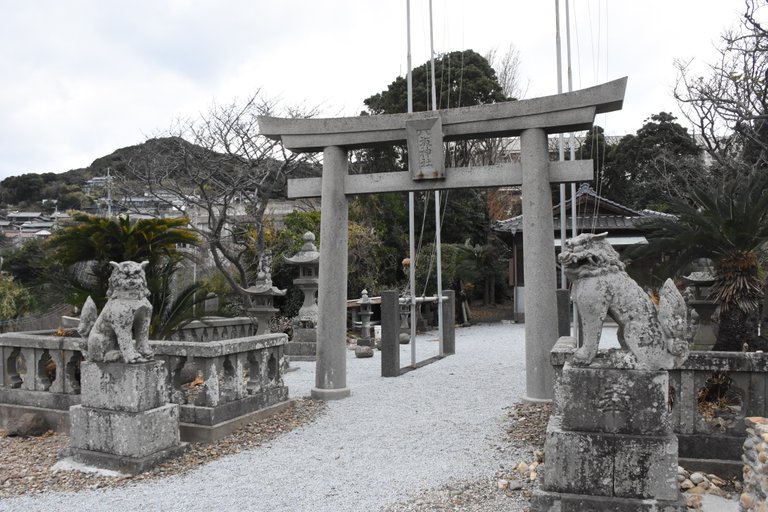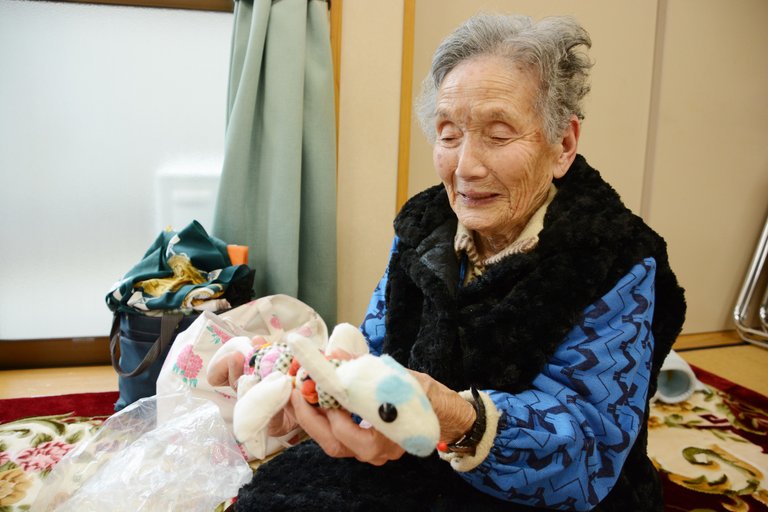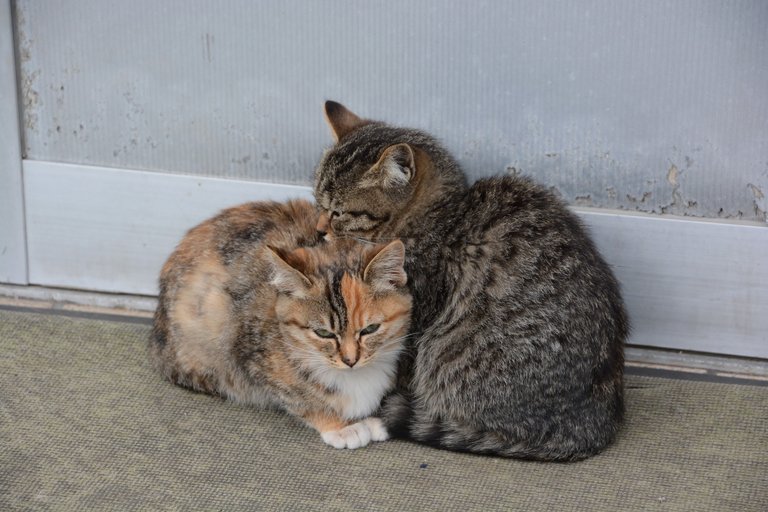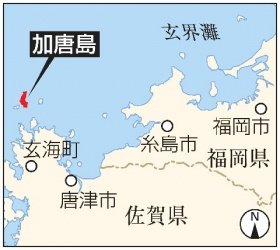Hello, Steemian. This is our first report on Steemit. Please post some comments about this article.
[Your Special Mission News Crew]
According to the Chinese zodiac calendar, 2018 is the Year of the Dog—the year where dogs take the spotlight once every 12 years. Despite dogs being in favor this year, we received a startling piece of information about an island that forbids residents from keeping dogs. To find out if there really was such a “dog-less island”, we visited Kakara Island, which is part of a small town called Chinzeicho in Karatsu City, Saga Prefecture in Japan.

Yasaka Shrine, Kakara Island
Strong winter winds were blowing hard in mid-December of last year when we hopped on the ferry from Yobuko Port in Karatsu to Kakara Island. We immediately interviewed a fellow passenger on the vessel, a 64-year-old woman. “I was born and raised on the island and I’ve never seen any dogs there,” she declared. The co-captain of the ship also assured us that he was “120% certain” that we would not find dogs on the island. Perhaps this legend was actually true.
The island has an area of approximately 2.8 square kilometers and a population of 131 (according to the 2015 Population Census), many of whom are farmers and fishermen. As we visited one house after another, the residents informed us that it was “impossible to raise dogs on the island” and that “keeping one would bring a curse” upon them.
Sueko Sakamoto, 88 years old, affirms that “there was a dog hunt back in the day.” This occurred more than 50 years ago, when someone brought a dog onto the island. Residents scattered meat throughout the island to lure and catch it. In recent years, the residents have become more tolerant to returnees and travelers bringing their dogs onto the island temporarily, but their fear of dogs remains quite intense.
There are, however, some residents who are dog lovers. Last November, the elderly of the island got together to craft dog dolls to celebrate the Year of the Dog. “Real dogs are a no-no, but dolls are fine,” says Shigeno Ogata, a 90-year-old woman who is thought to be the oldest on the island.

Shigeno Ogata
Had no one on the island ever kept a dog? Just when we were about to give up, we met Junko Sō, a 59-year-old nursery school teacher. “We had a dog for just 3 months. That was 17 years ago,” she says. “We were probably the only family that ever owned a dog on this island.”
Junko had decided to get an indoor dog after her then 3-year-old daughter begged her for one. The puppy had been small enough to fit on her palm. “I used to take it out for walks after dark and make it go up and down the hill in front of our house, so our neighbors wouldn’t find out.”
Her relatives repeatedly reminded her that “keeping a dog was unacceptable” and that “it would bring harm to the entire island.” As the dog grew bigger, its barking became much more noticeable. Reluctantly, Junko’s family had to give up their dog to relatives who lived off the island.
“He was whimpering, ‘I don’t want to leave.’” She still vividly remembers the way her dog looked like at the docks.
And so, we were left with one simple question: why are dogs banned on this island in the first place?
We heard several stories about misbehaved dogs: one that ate offerings to the Shinto gods; one that bit a Shinto priest’s leg while he was on a horse; one that peed on a Shinto priest, and one that gnawed at the shrine pillar… While these stories vary ever so slightly, they all revolve around Yasaka Shrine, located at the southern end of the island.
No one was there when we visited the shrine. There were, however, stone-carved guardian dogs sitting neatly on both sides of the two torii shrine gates. We looked around but could not find a single bite mark of a dog. Ultimately, we interviewed a total of 44 people on the island but could not find a single clue behind the lore.
The Your Special Mission News Crew searched for relevant information at prefectural libraries in Saga and Fukuoka, as well as the National Diet Library in Tokyo. While we did find a fieldwork report from 1952 that mentions that all residents participate in a dog hunt for as long as it takes whenever a dog set foot on the island, no reason was explained (Ritō Seikatsu no Kenkyū, The Folklore Society of Japan).
Even Takao Furusato, a 62-year-old man who is the chief priest of both Furusato Shrine in Karatsu City as well as Yasaka Shrine on the island, admitted “I don’t know the details of the origin of this legend.” Thus, the Year of the Dog arrived while the mystery remained unsolved.

Kakara Island is known to be an island of many cats
The absence of dogs may explain the reason that Kakara Island is known to be a Nekojima: an island of many cats. Wild boars have also increased in number in recent years. There are an estimated 300 wild boars, far more than the inhabitants, and crop damage has become a serious issue.
A 67-year-old woman whose farm had been overrun, says in a hushed tone: “Dogs could bark and drive off pests, but no one can keep one. They don’t want be held responsible if anything bad happens on the island.”
The “Dog-less Island” is experiencing an unanticipated side effect, due to their devotion to of their ancient traditions.
戌年も犬の居ぬ島 佐賀・加唐島 「罰当たる」由来は謎
今年は戌(いぬ)年。犬にとっては12年に1度、脚光を浴びる「ハレの年」だ。そんな中、「犬を飼ってはいけない島がある」という驚愕(きょうがく)の情報が寄せられた。本当に「犬の居ぬ島」なのか-。特命取材班は佐賀県唐津市鎮西町の加唐(かから)島を訪れた。
強い冬風が吹き付ける昨年12月中旬。同市呼子町から加唐島に向かう船に乗った。さっそく乗り合わせた女性(64)に聞くと「島で生まれ育ったが、犬は見たことなか」。副船長の緒方泰さん(39)も「120パーセントいないよ」と断言した。やはり、伝説は本当なのか。

島の面積は約2・8平方キロ、人口は131人(2015年国勢調査)。農業と漁業が盛んな島である。1軒ずつ民家を訪ねると、住民たちは口々に「島じゃ絶対に飼えない」「飼うと罰(ばち)が当たるよ」と話した。
坂本末子さん(88)は「昔、“犬狩り”があった」と証言する。50年以上前、犬を連れてきた人がいた。島民総出で島中に肉をまいておびき寄せ、捕まえたという。近年、島外からの帰省者や旅行客が一時的に犬を連れてくることには寛容になったというが、犬への恐れぶりは相当なものだ。
犬好きの住民もいる。昨年11月末には島のお年寄りが集い、犬の干支(えと)人形を作った。島の最高齢とされる緒方シゲノさん(90)は「生きた犬はだめだけど、人形なら大丈夫」。

緒方シゲノさん
本当に飼ったことのある島民はいないのか。諦めかけたところで保育士の宗順子さん(59)と出会った。「17年前、3カ月だけ犬を飼いました。たぶん島でうちだけでしょう」
当時3歳の娘からせがまれ、外に出さずに飼うことにした。手のひらに乗るほどの子犬。「散歩は暗くなってから。住民に見られないよう、家の前の坂を上り下りさせた」
親族からは「飼ってはだめ」「島全体がおかしくなる」と言われ続けた。成長するにつれて鳴き声が大きくなり、泣く泣く3カ月で島外の親族に譲った。
「『行きたくない』と悲しそうに鳴いていた」。船着き場での犬の姿を、今も鮮明に覚えているという。
■
そもそも、どうして「犬禁止」なのだろう。
「供え物を犬が食べた」「馬に乗った神主の脚を犬がかんだ」「犬が神主におしっこをかけた」「犬が神殿の柱をかじった」…。微妙に異なるが、いずれも島の南端にある「八坂神社」にまつわる話を聞いた。

佐賀県・加唐島の南端にある八坂神社。入口に狛犬がいた
神社には誰もいない。2基の鳥居の両端には狛犬(こまいぬ)が鎮座する。神殿を見回したが、犬のかじった跡は見当たらない。結局、島にいた計44人に話を聞いたが、手がかりは得られなかった。
特命取材班は、佐賀、福岡の県立図書館や東京の国立国会図書館で関連文献を探した。1952年の現地調査を基に「犬が上陸すると何日かかっても総出で犬狩りをする」(『離島生活の研究』、日本民俗学会)との記述を発見したが、理由には触れていない。
佐賀県唐津市の古里神社の宮司で、八坂神社の宮司も兼務する古里孝夫さん(62)も「詳しい由来は知らない」。真相は謎のまま、戌年を迎えてしまった。
■
犬がいないことが一因なのか、加唐島は猫が多い「猫島」として知られる。さらに近年増えたのがイノシシ。人口をはるかに上回る300頭ほどおり、食害が多発しているという。
畑が荒らされた女性(67)は声を潜めた。「犬ならほえて追い払ってくれるけど、だれも飼えない。もし島で悪いことがあったら、自分のせいになるから」
「犬の居ぬ島」は、いにしえの言い伝えを守り続ける人々の信心深さゆえ、思わぬ余波にさらされていた。
※この記事は西日本新聞で掲載した記事を翻訳、再掲載したものです。
西日本新聞 犬が居ぬ島
こういった風習が残ってるの面白いですね。
由来はわからないが教え伝えられて守られてかたことに深い信仰心を感じますね。
理由がわからないけれど続いていることって多そうですね。
このようなCulture関連記事はculturevulture タグを利用すると世界で注目されやすいです。
ありがとうございます。次回は利用してみますね。
Hey @westjapandaily, great post! I enjoyed your content. Keep up the good work! It's always nice to see good content here on Steemit! :)
Thank you for your comment (from our team member)!
Great One, i had to read it all. Thanks for nice and interesting content, hoping to read more of this here on your page.
Yes, We're considering what kind of story we should post for the community... Thank you!
最初、読んでいて犬の話かと思ったのですが・・・深いーですね。私の母の実家は神社の神主の家なのでピンとくるものがあります。まあ私自身はどちらかといえば猫好きなのですが(笑)。
コメントありがとうございます。私(運営スタッフ)のまわりには猫好きが多いです。
This is so interesting - even though I love all animals I have a soft spots for cats so I will feel very at home
Thank you, maybe you like this island...
I love this kind of news. Interesting history.
I'm glad to hear that. Thanks!
日本にはこういう信じられないような風習が残っているところが各地にあるのかもしれません。
興味深い記事でした。
九州出身者の私でも知りませんでした。とても興味深い!
また楽しい記事、お堅い記事、楽しみにしています。
あっ、私が犬も猫もどちらも好きです(≧▽≦)家族が動物嫌いなので飼えませんが…。
What a fun story! I can tell I'm going to enjoy following your articles. An island without dogs makes me sad though. :)
a dog less island sounds like my kind of place, no endless barking unlike Tucson AZ where I live now, that should be renamed Dog City.
Wow interesting. Now we know more abt Japan. 👍
西日本新聞さんのイメージが変わりました!